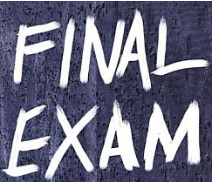 Abraham Lincoln
If given the truth, the people can be depended upon to meet any national crisis...
Abraham Lincoln
If given the truth, the people can be depended upon to meet any national crisis...
 Guildford news...
for Guildford people, brought to you by Guildford reporters - Guildford's own news service
Guildford news...
for Guildford people, brought to you by Guildford reporters - Guildford's own news service
Aidan’s Diary: In Defence Of Taking Exams
Published on: 23 Aug, 2020
Updated on: 23 Aug, 2020

Aidan Todd.
Aidan Todd is 19 years old and has lived in Guildford for most of his life. He is planning to study politics and international relations at university. He is writing some articles over the summer for The Guildford Dragon NEWS. This is his third, in which he comes to the conclusion that exams might be better than we give them credit for.
If you’d told me just over three years ago that I’d be writing an article defending exams, my younger self would view me as a traitor.
After all, when I was doing GCSEs they were the bane of my existence, the cause of all of society’s ills, corrupt, draconian, and designed to purge each student of creativity and original thinking.
There is indeed something quite stifling about exams. sending the message that your academic worth is based on your ability to follow instructions rather than your knowledge on a subject. It does certainly advantage people who work well under pressure and have good memorisation skills, as opposed to having a good work ethnic but struggling with those two things.
However, what the recent A-level fiasco has shown, where my whole year group were initially given grades based on a deeply unfair algorithms based on the performance of one’s school last year, is that, despite their flaws, exams do provide the fairest and most meritocratic system of allocating grades possible.
 I remember having a conversation with my dad a few years back, with him trying yet again to get me to put more effort into revising. He had tried repeating the same mantra of ‘it is the way it works and you must follow it’ but that of course, with my stubbornness, failed. However, this time he tried something very different. He appealed to my interest in history to spin the exam system in a different way.
I remember having a conversation with my dad a few years back, with him trying yet again to get me to put more effort into revising. He had tried repeating the same mantra of ‘it is the way it works and you must follow it’ but that of course, with my stubbornness, failed. However, this time he tried something very different. He appealed to my interest in history to spin the exam system in a different way.
The principle of the exam is that every student across the country takes it in the same conditions, and gets marked according to the same mark scheme. Whilst there are different exam boards, the qualifications and grades are worth the same and therefore carry the same academic currency.
It’s easy to take that for granted, but the fact is there is something deeply meritocratic and quite admirable about such a system compared to how one’s position in a society was usually determined throughout history, which was almost always through connections or how wealthy your family was. With the exam system, anybody who takes the time to learn how to take it, can be successful, whatever your class, gender, or ethnic background.
 The problem with having coursework or relying on teacher assessments (although this year that is far superior to the government algorithm) is that it is clearly susceptible to abuse.
The problem with having coursework or relying on teacher assessments (although this year that is far superior to the government algorithm) is that it is clearly susceptible to abuse.
Private and state schools in wealthy areas get much more teacher interaction than at a state school in a more disadvantaged area, with teachers on average predicting better grades the more teacher interaction they have. Advantaged kids will also usually have access to more assistance with coursework than disadvantaged kids, which makes the system subject to manipulation.
With coronavirus making exams unfeasible, with the government trying and failing to come up with an effective substitute that is fair, it gives us the chance to reflect, and conclude perhaps, that exams might be better than we’ve given them credit for.
Recent Articles
- Guildford Institute’s Crowdfunding Project for Accessible Toilet in its New Community and Wellbeing Centre
- Letter: Guildford – Another Opportunity Missed?
- Letter: GBC’s Corporate Strategy – Where Is the Ambition?
- My Memories of John Mayall at a Ground-breaking Gig in Guildford Nearly Six Decades Ago
- Westborough HMO Plans ‘Losing the Heart of the Street’ Says Resident
- College Invests to Boost Surrey’s Economy and Close Digital Skills Gap
- Community Lottery Brings Big Wins for Local Charities
- GBC Housing Plan Promises ‘A Vibrant Urban Neighbourhood’ Near Town Centre
- Hospital Pillows ‘Shortage’ at the Royal Surrey
- Updated: Caravans Set Up Camp at Ash Manor School


Search in Site
Media Gallery
Dragon Interview: Local Artist Leaves Her Mark At One of England’s Most Historic Buildings
January 21, 2023 / No Comment / Read MoreDragon Interview: Lib Dem Planning Chair: ‘Current Policy Doesn’t Work for Local People’
January 19, 2023 / No Comment / Read MoreA3 Tunnel in Guildford ‘Necessary’ for New Homes, Says Guildford’s MP
January 10, 2023 / No Comment / Read More‘Madness’ for London Road Scheme to Go Ahead Against ‘Huge Opposition’, Says SCC Leader
January 6, 2023 / No Comment / Read MoreCouncillor’s Son Starts Campaign for More Consultation on North Street Plan
December 30, 2022 / No Comment / Read MoreCounty Council Climbs Down Over London Road Works – Further ‘Engagement’ Period Announced
December 14, 2022 / No Comment / Read MoreDragon Interview: GBC Reaction to the Government’s Expected Decision to Relax Housing Targets
December 7, 2022 / No Comment / Read MoreHow Can Our Town Centre Businesses Recover? Watch the Shop Front Debate
May 18, 2020 / No Comment / Read More









Recent Comments